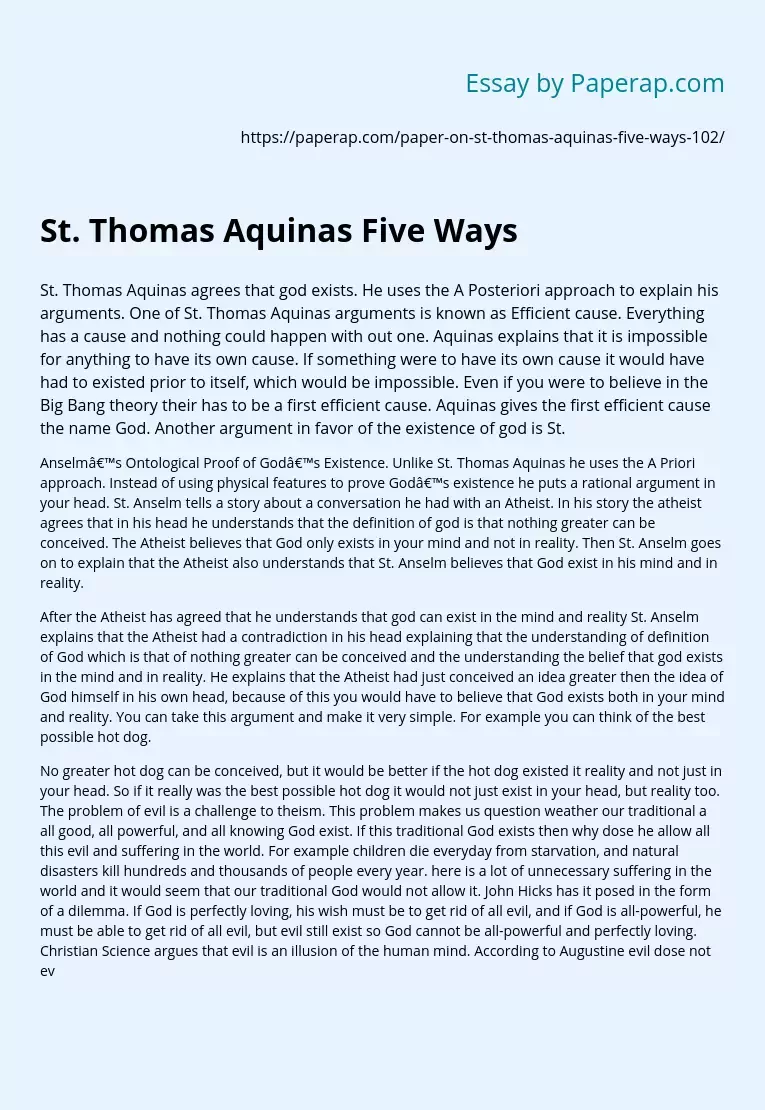St. Thomas Aquinas Five Ways
St. Thomas Aquinas agrees that god exists. He uses the A Posteriori approach to explain his arguments. One of St. Thomas Aquinas arguments is known as Efficient cause. Everything has a cause and nothing could happen with out one. Aquinas explains that it is impossible for anything to have its own cause. If something were to have its own cause it would have had to existed prior to itself, which would be impossible. Even if you were to believe in the Big Bang theory their has to be a first efficient cause.
Aquinas gives the first efficient cause the name God. Another argument in favor of the existence of god is St.
Anselm’s Ontological Proof of God’s Existence. Unlike St. Thomas Aquinas he uses the A Priori approach. Instead of using physical features to prove God’s existence he puts a rational argument in your head. St. Anselm tells a story about a conversation he had with an Atheist.
In his story the atheist agrees that in his head he understands that the definition of god is that nothing greater can be conceived. The Atheist believes that God only exists in your mind and not in reality. Then St. Anselm goes on to explain that the Atheist also understands that St. Anselm believes that God exist in his mind and in reality.
After the Atheist has agreed that he understands that god can exist in the mind and reality St. Anselm explains that the Atheist had a contradiction in his head explaining that the understanding of definition of God which is that of nothing greater can be conceived and the understanding the belief that god exists in the mind and in reality. He explains that the Atheist had just conceived an idea greater then the idea of God himself in his own head, because of this you would have to believe that God exists both in your mind and reality. You can take this argument and make it very simple. For example you can think of the best possible hot dog.
No greater hot dog can be conceived, but it would be better if the hot dog existed it reality and not just in your head. So if it really was the best possible hot dog it would not just exist in your head, but reality too. The problem of evil is a challenge to theism. This problem makes us question weather our traditional a all good, all powerful, and all knowing God exist. If this traditional God exists then why dose he allow all this evil and suffering in the world. For example children die everyday from starvation, and natural disasters kill hundreds and thousands of people every year. here is a lot of unnecessary suffering in the world and it would seem that our traditional God would not allow it. John Hicks has it posed in the form of a dilemma. If God is perfectly loving, his wish must be to get rid of all evil, and if God is all-powerful, he must be able to get rid of all evil, but evil still exist so God cannot be all-powerful and perfectly loving. Christian Science argues that evil is an illusion of the human mind. According to Augustine evil dose not even exist it is a lower form of good. Evil is something negative which means it is not created by god, but does not necessary mean evil cannot exist.
Christians have always explained that there is evil because god gave us free will. Free will is our ability to control our action, you can do good things in the world or bad. A solution to this belief is why could god guarantee people to always act rightfully to not hurt or kill one another. With the argument of free will comes the idea that the earth is a place for soul making. This argument explains that there is evil on earth so we can learn from it. A good example is a death in the family causes you pain therefore you should not kill. The existence of our environment helps the development of the moral qualities of human personality.
St. Thomas Aquinas Five Ways. (2017, Nov 28). Retrieved from https://paperap.com/paper-on-st-thomas-aquinas-five-ways-102/

